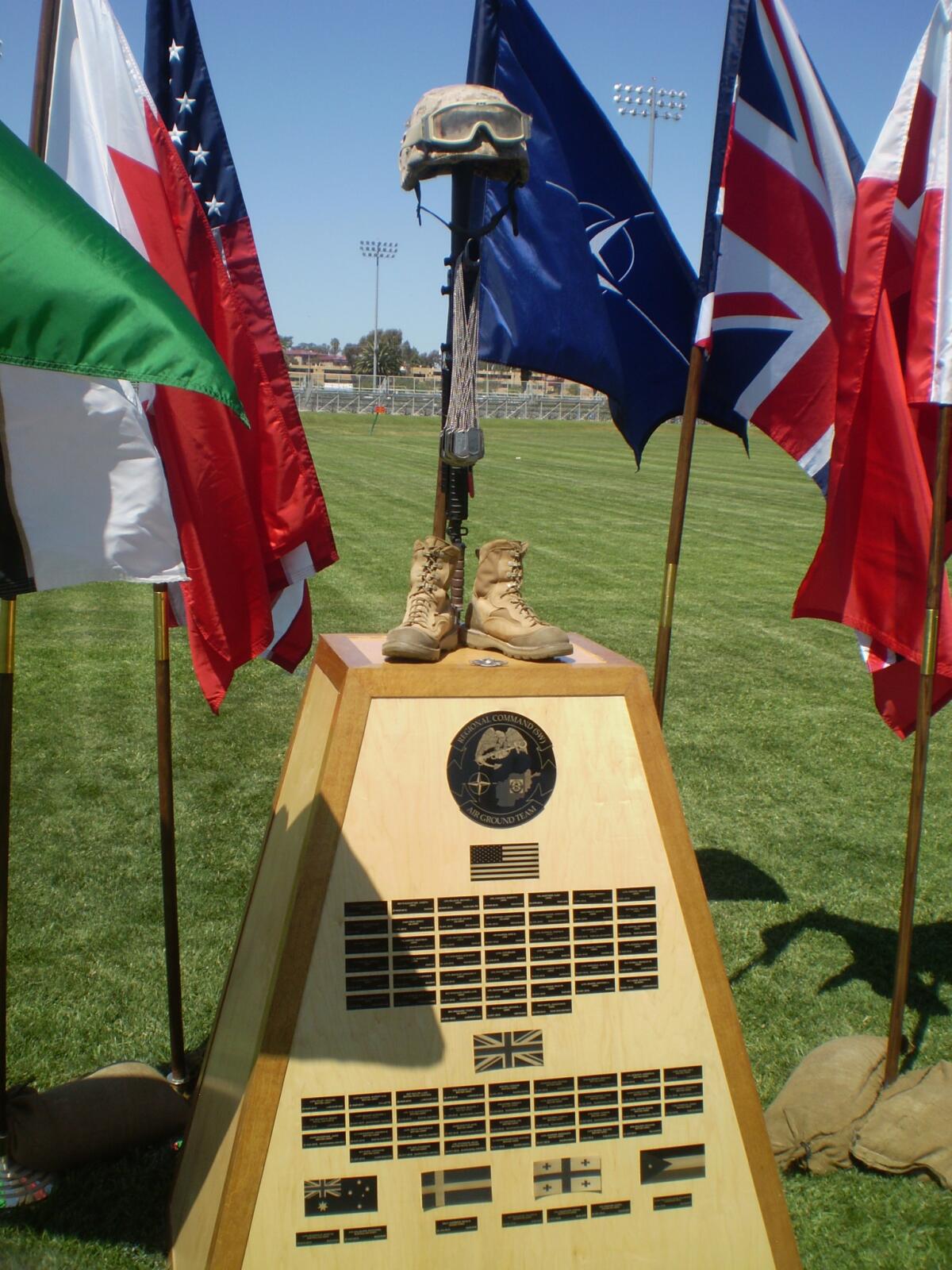Memorial at Camp Pendleton remembers coalition fallen

- Share via
CAMP PENDLETON -– It took more than an hour Thursday for the names of the fallen to be read aloud -- American, British, Danish, Jordanian, Georgian and Australian -- in tones that were crisp and respectful.
Behind the iconic, inverted-rifle display were the flags of the nations that, under Marine leadership, fought for the past year to wrest southern Afghanistan from Taliban control.
Along with those flags was the flag of Afghanistan, whose security forces are assuming greater responsibility for fighting the Taliban as the U.S. continues to remove its combat troops from Afghanistan by late 2014.
While memorial services have become commonplace at this sprawling base during more than a decade of war, this one was unique: international in scope and redolent of the fact that the combat role of the U.S. and its coalition partners is coming to an end.
“Increasingly, it’s not our war, it’s the Afghans’ war,” said British Brigadier Stuart Skeates. “They’re the senior partners now in the fight.”
The 80-plus names were those of troops killed from February 2012 to March 2013 when the Camp Pendleton-based 1st Marine Expeditionary Force (Forward) was in command of all U.S. and coalition troops in Helmand province and adjoining areas.
Skeates was deputy commander. The commander was Marine Maj. Gen. Charles Gurganus. It was Gurganus’ idea to break with tradition and make sure the memorial honored not just Marines and other U.S. forces but also coalition troops.
“They were part of the team just as much as the U.S. troops,” Gurganus said. “They weren’t stuck off to the side.”
As a bell tolled slowly, each of the names was read. With each name, a Marine marched to the display to place a dogtag with the name of the fallen. Names were inscribed on a plaque
“For our tomorrows, they gave their todays,” said Navy chaplain Capt. Guy Lee.
Among the names were 39 Americans and 33 from the United Kingdom and the rest from other coalition partners.
While there was sadness, there was also some humor about the difficulty of coalition warfare. “We British on occasion can be a difficult breed,” Skeates said.
And Gurganus noted that although the British and American troops speak the same language, sometimes the two sides have trouble communicating. “They speak English, we speak American,” he said.
To the families in attendance, Gurganus promised that their loved ones would not be forgotten. “Not a day goes by that I don’t see those flag-drapped coffins being smartly loaded aboard those C-130s for that final trip home,” he said.
Jack Beauchamp, a tow-truck driver from a community west of Fort Worth, came to the ceremony to honor his son: Navy corpsman Clayton Beauchamp, who was 21 when he was killed in August 2012 during a foot patrol in Helmand province.
Beauchamp was escorted by Skeates for a close view of the inverted rifle display that included his son’s dogtag. He took pictures to show his wife at home.
“He stepped on an IED [a buried bomb],” Beauchamp said, his voice shaking slightly. “He was the only one killed in his group, the only one.”
Clayton Beauchamp’s body was escorted home by his older brother, Chris, also a Navy corpsman serving in Afghanistan. Despite his brother’s death, 28-year-old Chris Beauchamp recently re enlisted.
“He knows his little brother died doing what he loved,” their father said.
ALSO:
Greuel invites Garcetti to debate her on education -- today
Villaraigosa, in city address, notes gains, chides Garcetti and Greuel
Garcetti backed by school board member, defends education statements
Twitter: @LATsandiego
tony.perry@latimes.com
More to Read
Sign up for Essential California
The most important California stories and recommendations in your inbox every morning.
You may occasionally receive promotional content from the Los Angeles Times.













